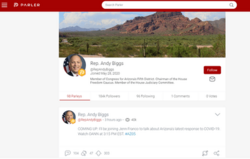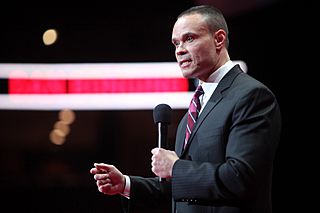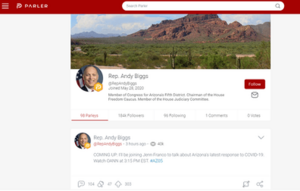Parler facts for kids
 |
|
| Type of business | Private |
|---|---|
|
Type of site
|
Social networking service |
| Founded | 2018 |
| Headquarters | Nashville, Tennessee |
| Founder(s) | John Matze Jr. Jared Thomson Rebekah Mercer |
| CEO | George Farmer |
| Industry | Internet |
| Employees | 30 |
| Parent | Starboard |
| Website | (currently down) |
| Registration | Required |
| Users | 700,000 to 1 million (active) as of January 2022[update] 20 million (total) as of January 2021[update] |
| Launched | September 2018 |
| Current status | Inactive |
Parler (pronounced "parlor") was an American social networking service. It was created as an alternative to other popular social media sites like Twitter and Facebook. Parler was launched in August 2018.
It was designed to be a place for "free speech" and was popular with people who felt censored on other platforms. Many users were conservatives, meaning they often supported traditional ideas and policies.
Parler grew very quickly in 2020. However, it faced criticism for not removing harmful content. After reports that Parler was used to plan events like the storming of the U.S. Capitol in 2021, major tech companies stopped providing services to Parler. This included Apple and Google removing its app from their stores, and Amazon stopping its web hosting.
Parler went offline in January 2021. It returned a month later, in February 2021, after finding new service providers. The app later became available again on Apple and Google app stores with new content filters. In April 2023, a company called Starboard bought Parler and temporarily shut it down to make changes.
Contents
How Parler Started
Parler was founded in August 2018 by John Matze Jr. and Jared Thomson. The name "Parler" comes from a French word meaning "to speak." At first, it was meant to be pronounced "PAR-lay," but most people started saying "PAR-ler."
Early Days and Growth
Parler aimed to be a place where people could speak freely without bias. In December 2018, a famous conservative speaker, Candace Owens, mentioned Parler. This brought 40,000 new users to the site very quickly.
Some well-known political figures and people who had been banned from other social media sites joined Parler. By May 2019, Parler had 100,000 users. In June 2019, its user base doubled when many users from Saudi Arabia joined. They said they felt censored on Twitter.
Growing in 2020
Parler saw a big increase in users in mid-2020. This happened when Twitter started flagging some posts by then-President Donald Trump. Parler responded by creating a "Declaration of Internet Independence." They encouraged users to leave Twitter and join Parler, using the hashtag "#Twexit."
A conservative commentator, Dan Bongino, announced in June 2020 that he had invested in Parler. He said he wanted to "fight back against" big tech companies like Facebook and Twitter.
In October 2020, many followers of the QAnon conspiracy theory moved to Parler. This happened after Facebook, Instagram, and YouTube banned content supporting QAnon. Other groups, like the Proud Boys, also joined Parler.
After the 2020 U.S. presidential election, Parler saw another huge wave of new users. Many American conservatives were worried about misinformation being removed from mainstream social networks. The Parler app was downloaded almost a million times in the week after Election Day. It became the most popular free app on both Apple and Google app stores.
What Happened in 2021
Parler was one of the social media services used to plan the storming of the U.S. Capitol on January 6, 2021. Parler had actually told the FBI about some alarming posts before the event.
After Twitter permanently removed President Donald Trump from its platform, Parler became the most downloaded app on the Apple App Store on January 8.
Parler Goes Offline
On January 8, 2021, Google removed Parler from its Play Store. Google said Parler did not have enough rules to stop harmful content, which was a "public safety threat." Apple also told Parler they had received complaints about its role in the Capitol events. Apple asked Parler to improve its content rules within 24 hours.
Parler's CEO, John Matze, said Parler would not "cave to pressure." Apple then removed Parler from its App Store on January 9. Other companies also stopped providing services to Parler.
On January 9, Amazon announced it would stop hosting Parler's website. Amazon said Parler's failure to control violent content was a "very real risk to public safety." Parler went offline on January 10 when Amazon stopped its services.
Parler sued Amazon, saying the shutdown was unfair and political. However, a judge ruled in Amazon's favor.
Data Collection Concerns
Just before Parler went offline, a researcher collected a huge amount of public posts from the site. This included over a million videos. Many of these videos had GPS data, which showed the exact locations where they were recorded.
The researcher wanted to create a public record of evidence against those involved in the Capitol events. Experts said Parler's website had weak security, which made it easy to collect this data. Even posts users tried to delete were still available.
Changes and Return Online
Parler's board, led by Rebekah Mercer, removed John Matze from his CEO role on January 29, 2021. Matze said he disagreed with how the site was being managed and believed it needed to control harmful content more.
Parler returned online for existing users on February 15, 2021. It had a new look and logo. The company said it would use human and artificial intelligence to monitor violent content. It also said it would hide posts that attack people based on their gender, race, or religion, but users could still choose to see them.
Apple initially refused to put Parler back in its App Store. Apple said it still found "highly objectionable content" like hate speech and Nazi symbols. However, a changed version of the Parler app was released on the App Store on May 17, 2021. This version blocks posts identified as "hate" within the app, but they can still be seen on the website.
Parler also returned to the Google Play Store on September 2, 2022. This happened after Parler agreed to moderate posts shown in the Android app.
In October 2022, Parler's parent company announced that musician Kanye West had agreed to buy the platform. This news came after West was blocked from Instagram and Twitter for making antisemitic comments. However, the deal was later canceled in December 2022.
Acquisition and Hiatus in 2023
On April 14, 2023, a digital media company called Starboard announced it had bought Parler. Starboard said it would temporarily shut down the social site to prepare a new version. Starboard explained that a "Twitter clone just for conservatives" was not a good business idea anymore.
How Parler Was Used
Parler had fewer than a million users until early 2020. By July 2020, it had 2.8 million total users. After the 2020 U.S. election, Parler gained 3.5 million users in one week. It had about four million active users and over ten million total users that month.
However, many experts doubted Parler would stay popular. Its user numbers dropped after the initial surges. Compared to Twitter (187 million daily users) and Facebook (1.8 billion daily users), Parler's user base was much smaller.
Many high-profile figures who joined Parler still used mainstream social networks more often. Some users saw Parler as a backup in case they were banned from other sites.
Who Used Parler
Parler had a large user base of conservatives. Many well-known Republican politicians and media personalities used the app.
Groups like the Anti-Defamation League reported that Parler attracted many right-wing extremists. This included groups like the Proud Boys, QAnon supporters, and white supremacists. Leaked data also showed that some police officers and U.S. military members used the site.
Researchers and users noticed that Parler mostly had people with similar views. This created an "echo chamber," where people mainly heard ideas they already agreed with. Some experts believed this could make extreme views even stronger.
Parler was one of several "alt-tech" social networks. These platforms became popular with people who were banned from mainstream sites like Twitter, Facebook, and YouTube.
What Content Was on Parler
Parler was known for its conservative content. The company said it would not "fact-check" posts, which meant misinformation could spread easily. This included posts about the QAnon conspiracy theory, false claims about the 2020 U.S. election, COVID-19 misinformation, and anti-vaccine ideas.
Some critics said that Parler's "free speech" stance allowed for hate speech and violent threats. John Matze, the founder, believed that letting these views be "out in the open" would help people prove them wrong. However, critics argued that this approach could make bigotry worse.
A study found that Parler created an echo chamber for misinformation about vaccines.
Content Rules
Parler described itself as a "free speech" platform with very few rules. Matze said, "If you can say it on the street of New York, you can say it on Parler." Many conservatives praised Parler for offering an alternative to what they called censorship on mainstream platforms.
However, some users and journalists said Parler's rules were actually stricter than the company claimed. Parler's guidelines did not allow things like blackmail, support for terrorism, false rumors, or "fighting words."
In June and July 2020, Parler banned many left-leaning accounts. These included parody accounts or those that criticized Parler. Critics said Parler seemed to prioritize conservative speech over truly free speech.
Parler's user agreement also had unusual rules. One rule said Parler could remove content and ban users "at any time and for any reason or no reason." Another rule, later removed, said users might have to pay for Parler's legal costs if their actions caused problems.
By January 2021, Parler had increased its moderation team to 600 people. They also started hiring full-time staff to review content. Parler executives admitted that harmful content had remained on the platform because their volunteer moderators were overwhelmed. They also reported an increase in calls for violence before the Capitol events.
How Parler Looked and Worked
Parler was available as a website and a mobile app. It looked and worked very much like Twitter.
Users could create accounts and follow others. Posts on Parler were called "parleys" and were limited to 1,000 characters. Users could "vote" on or "echo" posts, similar to "liking" and "retweeting" on Twitter. There was also a private messaging feature.
Public figures had a gold badge to show their accounts were real. Parody accounts had a purple badge. Users who proved their identity with a government ID got a red badge.
Signing Up and Security
Creating an account on Parler was free. Users needed to provide an email address and a phone number. To get a verified account (with a red badge), users could send a photo of themselves and their government ID. Parler said these ID scans were destroyed after verification.
Many publications and researchers criticized Parler's security. In November 2020, a security researcher showed how easy it was to pretend to be a verified user due to security flaws.
In January 2021, before Parler went offline, a researcher easily collected a huge amount of public data. This included videos with GPS locations and even posts users had tried to delete. This was possible because of poor coding and security weaknesses on the Parler website.
Who Owned Parler
Parler was founded by John Matze and Jared Thomson in 2018. In November 2020, it was reported that Rebekah Mercer, a well-known conservative investor, had helped fund Parler. She later said she "started Parler" with Matze.
Parler did not fully share who its owners were. However, Dan Bongino publicly announced he had bought a share in the company.
After John Matze was removed as CEO in January 2021, an executive committee led by Rebekah Mercer took over. Mark Meckler became the interim CEO, and then George Farmer was named CEO in May 2021. Farmer had a background in finance and conservative politics in the United Kingdom.
In March 2021, Parler's lawyers claimed the company was worth "approaching $1 billion."
How Parler Was Funded
In June 2020, John Matze said Parler wanted to raise money from investors. He worried that some investors might not be interested due to political differences. Parler also planned to make money from advertising and by connecting companies with influencers for sponsored content.
However, some experts questioned if Parler's advertising model would work. They wondered if big brands would want to advertise next to "controversial material." Matze said in June 2020 that the business was not yet making a profit.
In January 2022, Parler raised $20 million in funding. By September 2022, it had raised a total of $56 million.
See also
 In Spanish: Parler para niños
In Spanish: Parler para niños
- Gab (social network)
- Gettr
- Truth Social
- List of social networking websites
 | Roy Wilkins |
 | John Lewis |
 | Linda Carol Brown |




